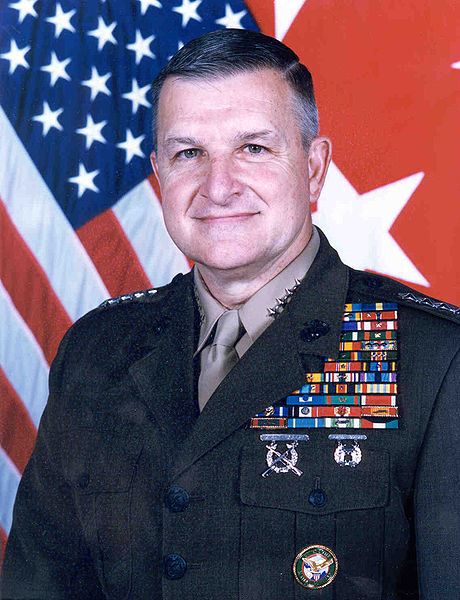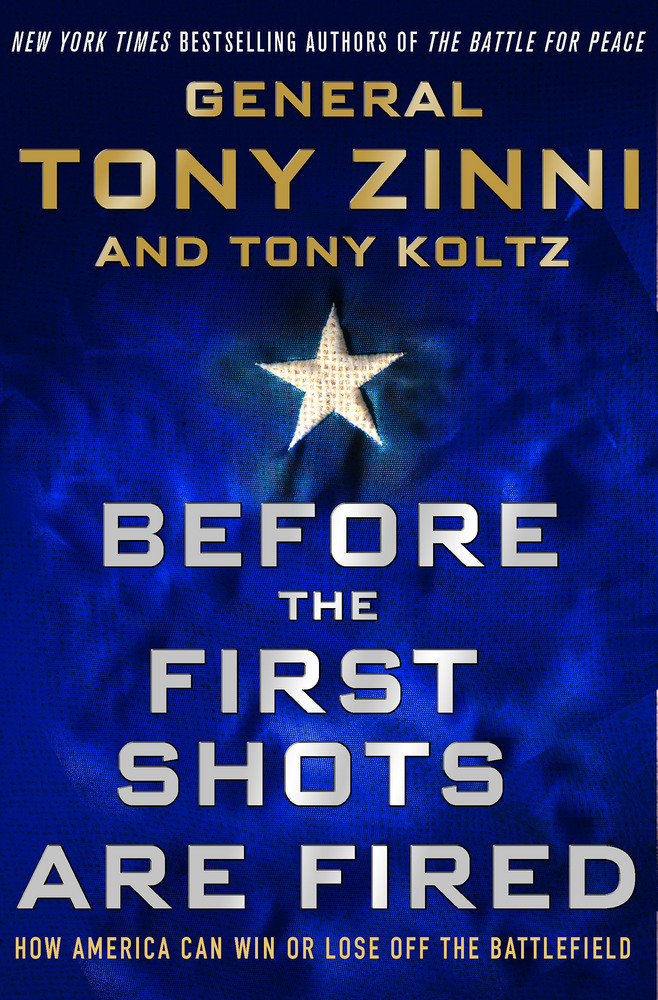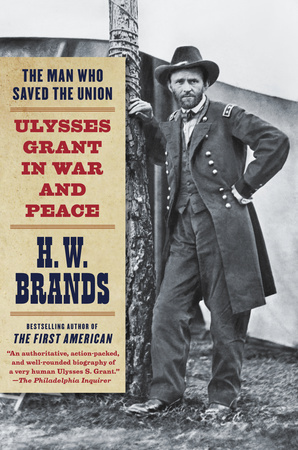Strategic Moments: General Tony Zinni Recommends Three Books Highlighting the Military Brilliance of Three Generals
Special Feature
Strategic Moments: General Tony Zinni Recommends Three Books Highlighting the Military Brilliance of Three Generals
 We are honored to share with you a wonderful essay written exclusively for Bookreporter.com by retired four-star General Tony Zinni, whose new book, BEFORE THE FIRST SHOTS ARE FIRED: How America Can Win or Lose Off the Battlefield (co-written with Tony Koltz), is now available. In this piece, General Zinni discusses three books spotlighting three of his favorite generals --- George Washington, Ulysses S. Grant and George C. Marshall --- that he believes serve as best examples of particular military brilliance.
We are honored to share with you a wonderful essay written exclusively for Bookreporter.com by retired four-star General Tony Zinni, whose new book, BEFORE THE FIRST SHOTS ARE FIRED: How America Can Win or Lose Off the Battlefield (co-written with Tony Koltz), is now available. In this piece, General Zinni discusses three books spotlighting three of his favorite generals --- George Washington, Ulysses S. Grant and George C. Marshall --- that he believes serve as best examples of particular military brilliance.
 You cannot spend four decades in the military without consuming extraordinary numbers of books on military history. It's difficult to pick all-time favorites. I do, however, have favorites that serve as best examples of particular military brilliance.
You cannot spend four decades in the military without consuming extraordinary numbers of books on military history. It's difficult to pick all-time favorites. I do, however, have favorites that serve as best examples of particular military brilliance.
There are times in a conflict when a commander delivers a stroke of strategic genius that significantly changes the outcome of events and sets the course toward victory. Oddly enough, these strategic moments often get little notice and take a back seat to the battlefield action and tactical-level heroes that capture our attention.
Three of my favorite generals are George Washington, Ulysses S. Grant and George C. Marshall. They certainly were not leaders without flaws, but they knew their profession well and delivered victory because they clearly saw the path to victory and made key strategic decisions at critical times. Three books capture these strategic moments well.
 David Hackett Fischer's Pulitzer Prize-winning book, WASHINGTON’S CROSSING, superbly describes George Washington's daring New Jersey campaign of 1777. After suffering humiliating defeats fighting the conventionally superior British and Hessian forces in New York, Washington did not predictably go into winter quarters and lick his wounds. He boldly attacked the enemy through horrible weather conditions and with an army that was exhausted and on the verge of collapse. His series of bold attacks at Trenton and Princeton psychologically shocked the smug enemy who had little regard for his rebel army. They tasted defeat. Their commander was relieved of duty and a begrudging respect was won from them for his forces. His men tasted victory, and that held them together for the trying battles that lie ahead. Many historians claim that the Battle of Saratoga or the Battle of Yorktown was the decisive fight of the Revolutionary War, but I think the path to victory was set in the New Jersey campaign that Fischer so aptly describes.
David Hackett Fischer's Pulitzer Prize-winning book, WASHINGTON’S CROSSING, superbly describes George Washington's daring New Jersey campaign of 1777. After suffering humiliating defeats fighting the conventionally superior British and Hessian forces in New York, Washington did not predictably go into winter quarters and lick his wounds. He boldly attacked the enemy through horrible weather conditions and with an army that was exhausted and on the verge of collapse. His series of bold attacks at Trenton and Princeton psychologically shocked the smug enemy who had little regard for his rebel army. They tasted defeat. Their commander was relieved of duty and a begrudging respect was won from them for his forces. His men tasted victory, and that held them together for the trying battles that lie ahead. Many historians claim that the Battle of Saratoga or the Battle of Yorktown was the decisive fight of the Revolutionary War, but I think the path to victory was set in the New Jersey campaign that Fischer so aptly describes.
 THE MAN WHO SAVED THE UNION: Ulysses Grant in War and Peace is a bestseller written by historian H.W. Brands that provides an insightful view into the makeup and character of Ulysses S. Grant. His flaws are well known and often exaggerated. History has not been kind to him and recognized his strategic genius. Maybe that is because he saw things clearly and directly. His brilliance was founded in logic. He realized he possessed a materially superior force and that operations on all fronts should be coordinated under one strategic plan. He brought together operations in the north, west and east toward one relentless drive against the Confederacy that gave Lincoln his long-awaited victory before a critical election. Many Civil War generals are more recognized for their battlefield exploits, but this simple and humble leader was by far the true winner of the war.
THE MAN WHO SAVED THE UNION: Ulysses Grant in War and Peace is a bestseller written by historian H.W. Brands that provides an insightful view into the makeup and character of Ulysses S. Grant. His flaws are well known and often exaggerated. History has not been kind to him and recognized his strategic genius. Maybe that is because he saw things clearly and directly. His brilliance was founded in logic. He realized he possessed a materially superior force and that operations on all fronts should be coordinated under one strategic plan. He brought together operations in the north, west and east toward one relentless drive against the Confederacy that gave Lincoln his long-awaited victory before a critical election. Many Civil War generals are more recognized for their battlefield exploits, but this simple and humble leader was by far the true winner of the war.
 Ed Cray's book, GENERAL OF THE ARMY: George C. Marshall, Soldier and Statesman, provides an excellent portrait of America's greatest strategist. Churchill called George C. Marshall the true architect of victory in World War II. He entered a war with a woefully weak military compared to our enemies in every measure and turned it into the most powerful military in the world within a few years. His genius was in recognizing the power of our industrial might and how it could be brought to bear, in selecting superb battlefield commanders, and in understanding the importance of setting clear objectives in planning and preparation of the massive coalition forces that would defeat the Axis Powers. He would not be rushed into launching operations before the forces were trained and ready, and refused to get sidetracked by peripheral operations that were proposed by allied political and military leaders. His strategic genius was not confined to military matters. The Marshall Plan led to the true transformation of Europe, and his strategic vision allowed us to contain and deter the USSR and Red China until the end of the Cold War.
Ed Cray's book, GENERAL OF THE ARMY: George C. Marshall, Soldier and Statesman, provides an excellent portrait of America's greatest strategist. Churchill called George C. Marshall the true architect of victory in World War II. He entered a war with a woefully weak military compared to our enemies in every measure and turned it into the most powerful military in the world within a few years. His genius was in recognizing the power of our industrial might and how it could be brought to bear, in selecting superb battlefield commanders, and in understanding the importance of setting clear objectives in planning and preparation of the massive coalition forces that would defeat the Axis Powers. He would not be rushed into launching operations before the forces were trained and ready, and refused to get sidetracked by peripheral operations that were proposed by allied political and military leaders. His strategic genius was not confined to military matters. The Marshall Plan led to the true transformation of Europe, and his strategic vision allowed us to contain and deter the USSR and Red China until the end of the Cold War.
In my view, the best way to study military history is to first examine and understand the military concepts that go into achieving victory, such as strategic design, and then to seek out books that present the best descriptions of the applications of those concepts. The three books mentioned provide deep insights into the character and thinking of generals who truly understood what was needed to gain victory and how they translated that understanding into strategic action.
























